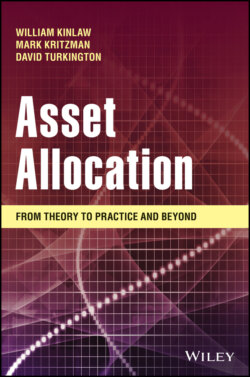Читать книгу Asset Allocation - William Kinlaw, Mark P. Kritzman - Страница 44
POTENTIAL ASSET CLASSES
ОглавлениеWe believe the following asset classes satisfy the criteria we proposed, at least in principle, though this list is far from exhaustive.
| Cash equivalents | Foreign developed market equities |
| Commodities | Foreign emerging market equities |
| Domestic corporate bonds | Foreign real estate |
| Domestic equities | Infrastructure |
| Domestic real estate | Private equity |
| Domestic Treasury bonds | Timber |
| Foreign bonds | Treasury Inflation Protected Securities (TIPS) |
The following groupings are often considered asset classes, but in our judgment fail to qualify for the reasons specified. Obviously, this list is not exhaustive. We chose these groupings as illustrative examples.
| Art | Not accessible in size |
| Global equities | Not internally homogeneous |
| Hedge funds | Not internally homogeneous and require selection skill |
| High-yield bonds | Not externally heterogeneous |
| Inflation | Not directly investable |
| Intermediate-term bonds | Not externally heterogeneous |
| Managed futures accounts | Not internally homogeneous and require selection skill |
| Momentum stocks | Unstable composition |
Let's focus on hedge funds for a moment, since many investors treat this category as an asset class. Most hedge funds invest across a variety of asset classes; thus, they are not internally homogeneous. Moreover, they comprise actively managed variants of other asset classes, so they are not externally heterogeneous. Finally, it is unlikely that a random selection of hedge funds will improve a portfolio's expected utility. Rather than treating hedge funds as an asset class, investors should think of them as a management style. The decision to allocate to hedge funds, therefore, should be a second-order decision. After determining the optimal allocation to asset classes, investors should next consider whether it is best to access the asset classes by investing in passively managed vehicles, active separately managed accounts, mutual funds, limited partnerships, or hedge funds.
In the next chapter, we describe the conventional approach to determining the optimal allocation to asset classes.
